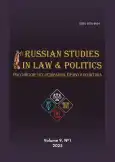The Genesis of Parliamentarism within a Monarchical Form of Government
- Authors: Ryabkova S.A.1, Kotov I.E.1
-
Affiliations:
- State University «Dubna»
- Issue: Vol 9, No 1 (2025)
- Pages: 128-145
- Section: Статьи
- Published: 31.03.2025
- URL: https://journal-vniispk.ru/2576-9634/article/view/301144
- DOI: https://doi.org/10.12731/2576-9634-2025-9-1-227
- EDN: https://elibrary.ru/BPLNLX
- ID: 301144
Cite item
Full Text
Abstract
Background. The question of the development of parliamentarism in Europe and Russia at the turn of the 19th and 20th centuries remains relevant in the context of studying the political modernization of countries and searching for historical parallels with contemporary democratization processes. In the Russian context, P.A. Stolypin's activities are of particular interest. He strived for the modernization of the country but simultaneously employed authoritarian methods of governance, creating tension in relations with the Duma and influencing the development of parliamentarism. The insufficient study of the specifics of Russian parliamentarism during this period, as well as the contradictory assessments of Stolypin's role in this process, determine the relevance of this research.
Objective: To examine the particularities of the establishment of European and Russian parliamentarism in the early 20th century.
Methodology. Historical-genetic, comparative, and institutional methods formed the basis of this research.
Results. It is concluded that dualism directly contributed to the development of parliamentarism, and, despite the contradictory nature of the situation, the Russian Empire was also moving along the path of parliamentarization.
Area of application of results. The research findings can be useful for analyzing contemporary political processes and searching for optimal ways to develop democratic institutions.
Keywords
About the authors
Svetlana A. Ryabkova
State University «Dubna»
Author for correspondence.
Email: rsa1988@yandex.ru
ORCID iD: 0000-0003-4597-0011
Associate Professor, Faculty of Social Sciences and Humanities, Candidate of Political Science
Russian Federation, 19, University Str., Dubna, Moscow region, 141980, Russian FederationIlya E. Kotov
State University «Dubna»
Email: tokkot789@gmail.com
ORCID iD: 0000-0003-4851-0483
Student of the Faculty of Social Sciences and Humanities
Russian Federation, 19, University Str., Dubna, Moscow region, 141980, Russian FederationReferences
- Alexander Ivanovich Guchkov tells ...: Memoirs of the chairman of the State Duma and the military. The Minister of Times. Governments: [Recording of a conversation between A. I. Guchkov and N. A. Bazili]. Moscow: Ed. journal LLP "Issues of history", 1993, 143 p.
- Baev V.G., Kramskoy V.V. Parliamentarism and the political (state) regime of exercising power: a methodological aspect of the dialectic of the development of two concepts. Sovremennoe pravo [Modern law], 2014, no. 2, pp. 12-19.
- The State Duma. The third convocation. Verbatim reports. Session 4. Part 3. St. Petersburg, 1911. Stb. 2861.
- The State Duma. The third convocation. Verbatim reports. Session I. Part 1. St. Petersburg, 1908. Stb. 137-138.
- Darchieva S.V. Modernization processes in the political system of the Russian Empire in the years 1905-1907. Vlast' [Power], 2012, no. 9, pp. 147-150.
- Demin V.A. Parliamentary activity of A.I. Guchkov. Vestnik Moskovskogo gorodskogo pedagogicheskogo universiteta [Bulletin of the Moscow City Pedagogical University], 2022, no. 4 (48), pp. 27-45.
- Kabytov P.S. P.A. Stolypin and the June Third Monarchy. Izvestija Samarskogo nauchnogo centra Rossijskoj akademii nauk [Proceedings of the Samara Scientific Center of the Russian Academy of Sciences]. 2011, Vol. 13, no. 3(2), pp. 386-390.
- Kerimov A.A. The Institute of parliamentarism in the legitimization of political power in modern Russia: actors, strategies, resources. Abstract of PhD dissertation. Yekaterinburg, 2018, 344 p.
- Konovalova L.G. The correlation of legal structures of parliamentarism and the political regime: through the prism of constitutional and legal theory. Uchenye zapiski Altajskogo filiala Rossijskoj akademii narodnogo hozjajstva pri Prezidente Rossijskoj Federacii [Scientific notes of the Altai Branch of the Russian Academy of National Economy under the President of the Russian Federation], 2021, no. 3, pp. 127-134.
- Merzlyakov S.L. Cooperation between P.A. Stolypin and the III State Duma as an example of the relationship between government and society for modern Russia. Vestnik Povolzhskoj akademii gosudarstvennoj sluzhby [Bulletin of the Volga Academy of Public Administration], 2012, no. 2(31), p. 55-60.
- Macy D. Land reform and political change: The Stolypin phenomenon. Voprosy istorii [Questions of History], 1993, no. 4, pp. 3-18.
- The Code of basic state laws of the Russian Empire. St. Petersburg: Book Association "Activist", 1912. Vol. I.
- Fedorova-Kuznetsova I.V. The monarchical system of power in the modern world and its features. Obshhestvo: politika, jekonomika, pravo [Society: politics, economics, law], 2019, no. 9. https://doi.org/10.24158/pep.2019.9.5
- Greenstein F., Herman V., Stradling R., Zureik E. The Child's Conception of the Queen and the Prime Minister. British Journal of Political Science, 1974, vol. 3, pp. 257-287.
- Hosking G. Russia: people and empire, 1552-1917. Cambridge, Mass: Harvard University Press, 1997, 503 p.
- Macey, David A. J. Government and Peasant in Russia, 1861-1906: The Prehistory of the Stolypin reform. Northern Illinois univ. press., 1987, 380 p.
- Pipes R.A. Coneise History of the Russian Revolution. Coneise. London, 1995, 431 p.
- Scocozza B. Politikens bog om danske monarker. Copenhagen: Politikens Forlag, 1997, 224 p.
- Strom K. Delegation and accountability in parliamentary democracies. European Journal of Political Research, 2000, vol. 37, pp. 261-289.
- The basic laws of Sweden. URL: https://sweden4rus.nu/rus/info/juridisk/konstitucija_shvecii.asp#sub_para_N_10000
- The Constitutional Act of Denmark. URL: https://www.thedanishparliament.dk/-/media/sites/ft/pdf/publikationer/the-constitutional-act-of-denmark.pdf
Supplementary files










